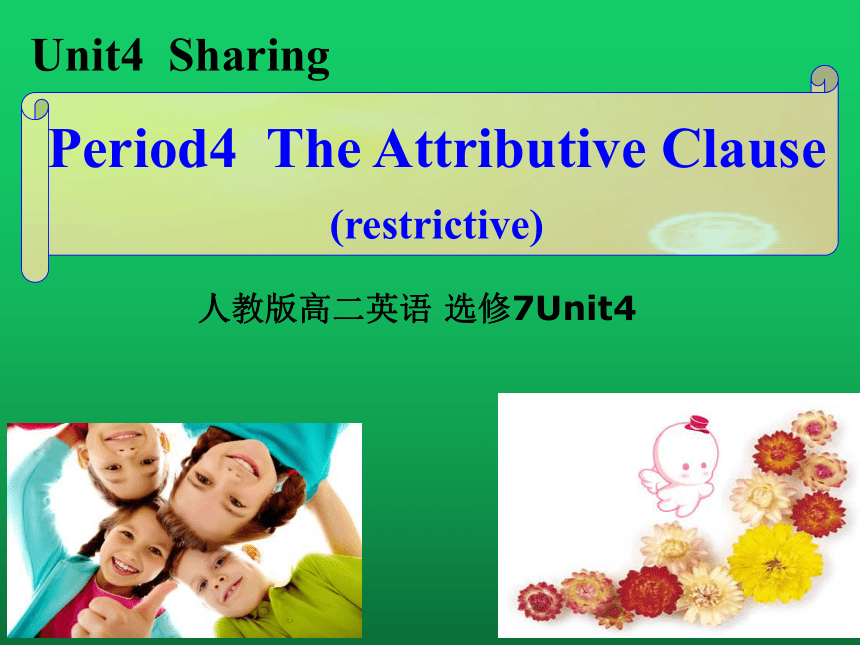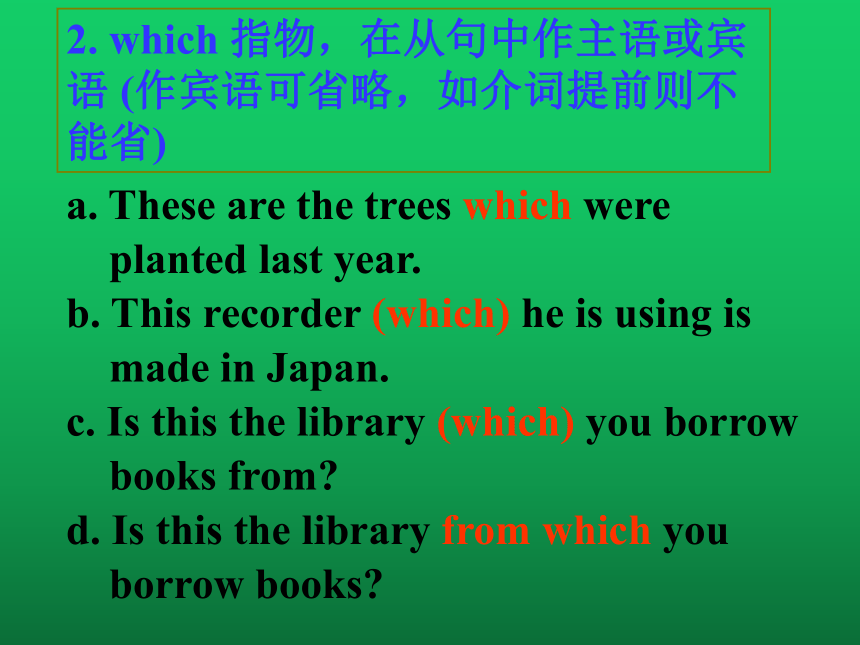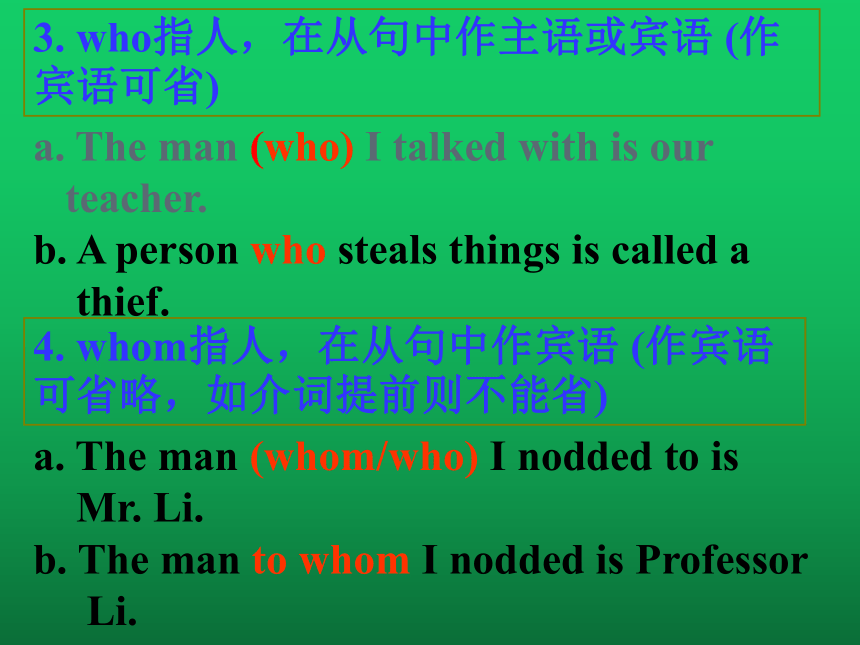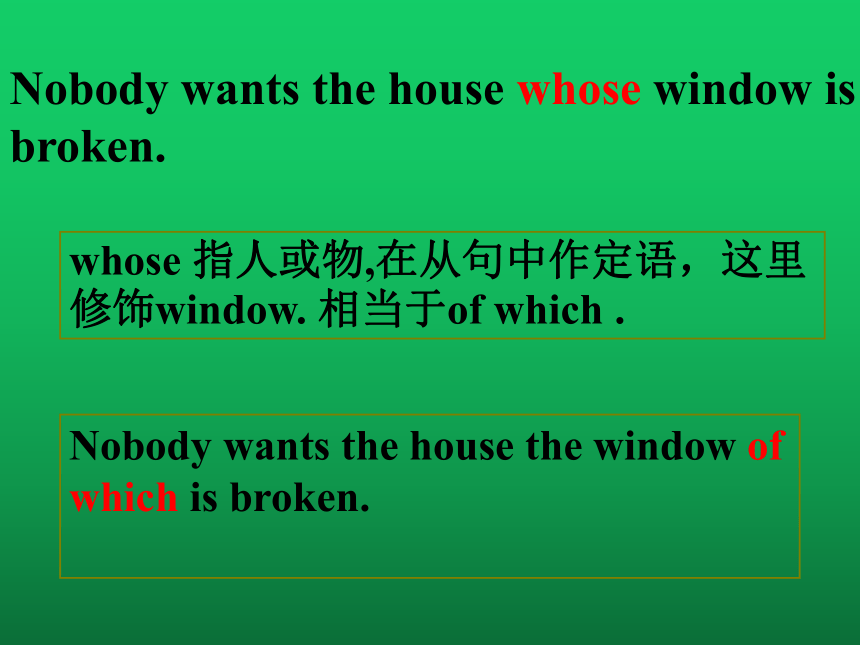人教版英语选修7Unit4 Sharing The Attributive Clause课件 (共23张PPT)
文档属性
| 名称 | 人教版英语选修7Unit4 Sharing The Attributive Clause课件 (共23张PPT) |

|
|
| 格式 | zip | ||
| 文件大小 | 1.2MB | ||
| 资源类型 | 教案 | ||
| 版本资源 | 人教版(新课程标准) | ||
| 科目 | 英语 | ||
| 更新时间 | 2020-04-22 00:00:00 | ||
图片预览









文档简介
(共23张PPT)
Unit4 Sharing
人教版高二英语 选修7Unit4
… so I've included some photos which
will help you picture the places I talk
about.
2. The boys who had never come across
anything like this before started jumping
out of the windows.
Sentences from this unit:
定语从句
Attributive Clauses
在复合句中,用来修饰某一名词或代词的从句叫定语从句。
The boy who is wearing a black coat bought the book yesterday.
被修饰的词
限制性定语从句
修饰the boy
被修饰的词:先行词
引导定语从句的词:关系词分为关系代词和关系副词两类,指代被修饰的词(先行词),并且在从句中充当成分。
先行词
关系词
若这个定语从句是先行词不可缺少的部分,去掉它主句意思不完整,它就是这个先行词的限制性定语从句。
关系词 指代 充当成分
关系
代词 that 人或物 主、宾、
which 物 主、宾
who 人 主、宾
whom 人 宾
whose 人或物 定语
关系
副词 where 地点
状语
when 时间
why 原因
A plane is a machine. It can fly.
A plane is a machine that can fly.
He is the man. I told you about him.
He is the man (that) I told you about.
1. that指人/物,作主语或宾语 (作宾语可省略)。
a. These are the trees which were
planted last year.
b. This recorder (which) he is using is
made in Japan.
c. Is this the library (which) you borrow
books from?
d. Is this the library from which you
borrow books?
2. which 指物,在从句中作主语或宾语 (作宾语可省略,如介词提前则不能省)
? Mrs. Clark is angry with the goat.
? The goat is eating her flowers.
? Can you lend me the book?
? You talked about it last night.
Can you lend me the book (which) you talked about last night?
Can you lend me the book about which you talked last night?
Mrs. Clark is angry with the goat which is eating her flowers.
a. The man (who) I talked with is our teacher.
b. A person who steals things is called a
thief.
a. The man (whom/who) I nodded to is
Mr. Li.
b. The man to whom I nodded is Professor
Li.
3. who指人,在从句中作主语或宾语 (作宾语可省)
4. whom指人,在从句中作宾语 (作宾语可省略,如介词提前则不能省)
whose 指人或物,在从句中作定语,这里修饰window. 相当于of which .
Nobody wants the house whose window is
broken.
Nobody wants the house the window of which is broken.
whose在从句中作定语,修饰 hair,相当于 of whom.
The woman whose hair is brown is our English teacher.
The woman the hair of whom is brown is our English teacher.
I am sure she has something (that) you
can borrow.
(1)先行词为all, everything, nothing,
something, anything, little, much 等不
定代词时。
that和which在指物的情况下一般都可以互换, 但在下列情况下, 一般用that而不用which。
This is the very book that belongs to him.
(2)先行词被all, every, no, some, any,
little, much等不定代词修饰时。
I’ve read all the books that are not mine.
(3)先行词被序数词或最高级修饰时。
This is the first book (that) he has read.
(4)先行词被the only, the very, the same,
the last修饰时。
(5)主句是以which,what ,who开头的特殊疑问句时。
Who is the person that is sitting in the car?
(6)先行词既有人也有物时。
They like to talk about the man and the
things that they know.
(7)两个定语从句中一个关系代词用which,另一个要用that.
(1)引导非限制性定语从句时。
只用which不用that
(2)关系代词前有介词时。
The house in which they lived last year has
been rebuilt.
(3)先行词本身是that时。
a. He told me the date when (on which)
he joined the Party.
b. 1949 was the year when (in which) the
P.R.C. was founded.
1. when指时间,在定语从句中充当时间状语。
关系副词引导定语从句时,既引导定语从句,又在定语从句中充当状语。关系副词可转化为介词+关系代词(which)结构。
a. This is the place where (in which) we
lived ten years ago.
b. The hotel is the one where (at which)
I stayed last month.
2. where指地点,在定语从句中充当
地点状语。
3. why指原因,在定语从句中充当原因
状语。
I know the reason why (for which) she
was so angry.
1. 限制性定语从句为先行词在意义上是不可缺少的定语,若去掉,所修饰主句的内容就不完整或失去意义。这种从句和主句的关系十分密切,写时不可用逗号分开。
2. 引导定语从句的关系代词有:that, which, who, whom, whose。引导定语从句的关系副词有:where, when, why。
1. The person _______________you
should write to is Mr. Ball.
2. The person to ______ you should write
is Mr. Ball.
3. This is the factory _______________
he worked ten years ago.
4.This is the factory ___________ makes
toys.
who/that/whom
whom
一、用适当的关系词填空。
where/in which
which/that
He did all / everything _____ he could to
help me.
2. This is the very thing ______ I am after.
3. He opened the door, in front of ______ sat
a boy.
that
that
that, which, whose, whom, who
which
二、 Fill in the blanks.
4. The man to ______ I spoke is a kind
teacher.
5. The boy ______ mother is dead was
brought up by his father.
whom
whose
that, which, whose, whom, who
Finish the exercises on Page 60
in the workbook.
Unit4 Sharing
人教版高二英语 选修7Unit4
… so I've included some photos which
will help you picture the places I talk
about.
2. The boys who had never come across
anything like this before started jumping
out of the windows.
Sentences from this unit:
定语从句
Attributive Clauses
在复合句中,用来修饰某一名词或代词的从句叫定语从句。
The boy who is wearing a black coat bought the book yesterday.
被修饰的词
限制性定语从句
修饰the boy
被修饰的词:先行词
引导定语从句的词:关系词分为关系代词和关系副词两类,指代被修饰的词(先行词),并且在从句中充当成分。
先行词
关系词
若这个定语从句是先行词不可缺少的部分,去掉它主句意思不完整,它就是这个先行词的限制性定语从句。
关系词 指代 充当成分
关系
代词 that 人或物 主、宾、
which 物 主、宾
who 人 主、宾
whom 人 宾
whose 人或物 定语
关系
副词 where 地点
状语
when 时间
why 原因
A plane is a machine. It can fly.
A plane is a machine that can fly.
He is the man. I told you about him.
He is the man (that) I told you about.
1. that指人/物,作主语或宾语 (作宾语可省略)。
a. These are the trees which were
planted last year.
b. This recorder (which) he is using is
made in Japan.
c. Is this the library (which) you borrow
books from?
d. Is this the library from which you
borrow books?
2. which 指物,在从句中作主语或宾语 (作宾语可省略,如介词提前则不能省)
? Mrs. Clark is angry with the goat.
? The goat is eating her flowers.
? Can you lend me the book?
? You talked about it last night.
Can you lend me the book (which) you talked about last night?
Can you lend me the book about which you talked last night?
Mrs. Clark is angry with the goat which is eating her flowers.
a. The man (who) I talked with is our teacher.
b. A person who steals things is called a
thief.
a. The man (whom/who) I nodded to is
Mr. Li.
b. The man to whom I nodded is Professor
Li.
3. who指人,在从句中作主语或宾语 (作宾语可省)
4. whom指人,在从句中作宾语 (作宾语可省略,如介词提前则不能省)
whose 指人或物,在从句中作定语,这里修饰window. 相当于of which .
Nobody wants the house whose window is
broken.
Nobody wants the house the window of which is broken.
whose在从句中作定语,修饰 hair,相当于 of whom.
The woman whose hair is brown is our English teacher.
The woman the hair of whom is brown is our English teacher.
I am sure she has something (that) you
can borrow.
(1)先行词为all, everything, nothing,
something, anything, little, much 等不
定代词时。
that和which在指物的情况下一般都可以互换, 但在下列情况下, 一般用that而不用which。
This is the very book that belongs to him.
(2)先行词被all, every, no, some, any,
little, much等不定代词修饰时。
I’ve read all the books that are not mine.
(3)先行词被序数词或最高级修饰时。
This is the first book (that) he has read.
(4)先行词被the only, the very, the same,
the last修饰时。
(5)主句是以which,what ,who开头的特殊疑问句时。
Who is the person that is sitting in the car?
(6)先行词既有人也有物时。
They like to talk about the man and the
things that they know.
(7)两个定语从句中一个关系代词用which,另一个要用that.
(1)引导非限制性定语从句时。
只用which不用that
(2)关系代词前有介词时。
The house in which they lived last year has
been rebuilt.
(3)先行词本身是that时。
a. He told me the date when (on which)
he joined the Party.
b. 1949 was the year when (in which) the
P.R.C. was founded.
1. when指时间,在定语从句中充当时间状语。
关系副词引导定语从句时,既引导定语从句,又在定语从句中充当状语。关系副词可转化为介词+关系代词(which)结构。
a. This is the place where (in which) we
lived ten years ago.
b. The hotel is the one where (at which)
I stayed last month.
2. where指地点,在定语从句中充当
地点状语。
3. why指原因,在定语从句中充当原因
状语。
I know the reason why (for which) she
was so angry.
1. 限制性定语从句为先行词在意义上是不可缺少的定语,若去掉,所修饰主句的内容就不完整或失去意义。这种从句和主句的关系十分密切,写时不可用逗号分开。
2. 引导定语从句的关系代词有:that, which, who, whom, whose。引导定语从句的关系副词有:where, when, why。
1. The person _______________you
should write to is Mr. Ball.
2. The person to ______ you should write
is Mr. Ball.
3. This is the factory _______________
he worked ten years ago.
4.This is the factory ___________ makes
toys.
who/that/whom
whom
一、用适当的关系词填空。
where/in which
which/that
He did all / everything _____ he could to
help me.
2. This is the very thing ______ I am after.
3. He opened the door, in front of ______ sat
a boy.
that
that
that, which, whose, whom, who
which
二、 Fill in the blanks.
4. The man to ______ I spoke is a kind
teacher.
5. The boy ______ mother is dead was
brought up by his father.
whom
whose
that, which, whose, whom, who
Finish the exercises on Page 60
in the workbook.
